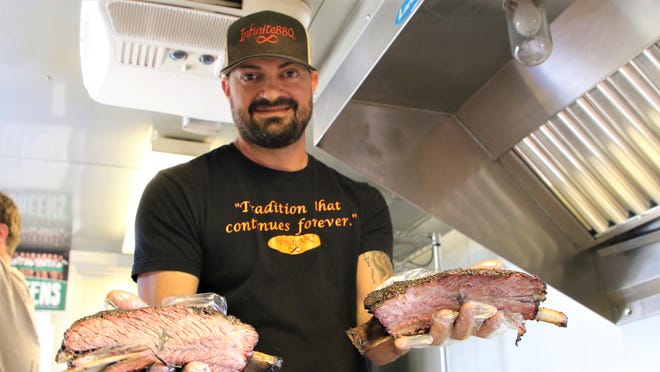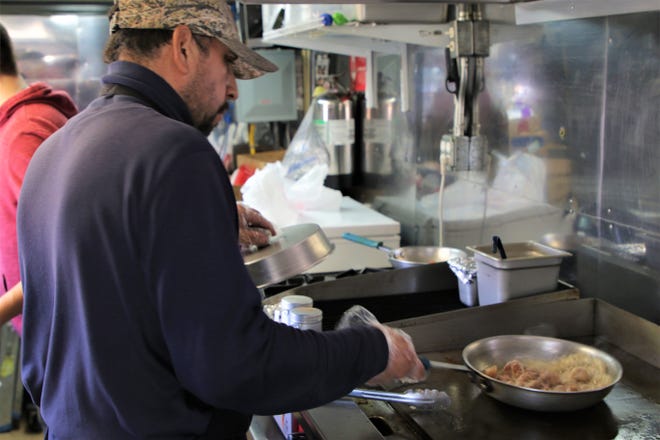Food truck boot camp offered by Farmington Women’s Business Center

- “Truckin’ It: Food Tuck Bootcamp” will be held at 5:30 p.m. March 9, 16, 23 and 30.
- The course will be led by Dawn Facka.
- Sign up for the class by visiting wesst.org or by calling 505-566-3715.
FARMINGTON — While she encourages anyone with an interest to take part, Dawn Facka is hopeful the free four-week virtual class on operating a food truck that she is leading in March as part of the Farmington Women’s Business Center is something that finds an audience of women.
“I have not seen a lot of women doing that,” said Facka, the regional manager of the non-profit group WESST, referring to entrepreneurs who start their own restaurant business in the form of a mobile operation.
“We’ve had a lot of interest from women, but right now, my perception is it’s pretty much a male-dominated industry in town,” Facka said.
The reasons for that are simple, she said.
“I don’t think they realize the availability and options to do so — as well as the support to do so. They think the support system is lacking. But at WESST, we offer the services to help them become successful,” she said.
WESST is a statewide nonprofit organization that focuses on small business development. The Farmington Women’s Business Center is an offshoot of WESST and its training programs are aimed primarily at women.
Story continues below.
Any woman interested in operating her own business should give the food truck industry some thought, Facka said, explaining it’s a field that presents relatively few complications and many potential rewards.
“It’s a great way for women to supplement the family income and get a leg up,” she said. ” … The nice thing about the food truck industry is, it doesn’t take a lot of money to start up and run. And we offer a microlending program that can help them.”
Getting into the food truck business is something that can be done with a minimum of financial risk, she said.

“If you’re looking at a coffee truck or a hamburger stand, it can be done for under $10,000, while a restaurant would cost at least $100,000,” she said. “Plus, the business is mobile, so you can take it from place to place.”
Facka also believes the timing is especially good for food truck operators, noting that the Farmington market is underserved.
“I think so, but I think that is changing,” she said. “With the way the city and county are moving toward outdoor recreation, those opportunities are being created.”
And since food trucks don’t offer indoor dining, they aren’t prone to the same kind of disruptions to their business model that traditional dining establishments have been since the COVID-19 pandemic began, she said.
This is the second year in a row the center has offered the class. During the initial run last year, which took place just before the pandemic began, five people took part. This year, Facka said eight people already had registered as of Feb. 22, and she is hopeful more will sign up, especially since this year’s program will be offered online and is targeting a statewide audience, not just a local one.
The course is open to anyone regardless of gender, and Facka said you don’t even need to be focused on opening a food truck to take part. In fact, she welcomes those who are just fans of food trucks and want to know more about them. There is no limit on the class size, and each class will be two hours in length.

The course will begin with a primer on the basics of operating a food truck — how to get licensed, how to develop a business plan and securing all the necessary equipment. From there, Facka will focus on how to market the business, how to financially manage the business, and how to grow and expand the operation.
When food truck operators fail, it’s usually because they didn’t pay attention to a few simple rules, she said — know and appreciate what your customers want to eat, and provide good customer service.
“Not everybody wants barbecue,” she said.
Facka likes the flexibility the business offers and said it can be a good fit for those with a creative mind.
“The nice thing about food trucks is, they’re so unlimited in what you can do with it,” she said, explaining that the menu can range from burgers or desserts to Native American cuisine or Chinese food. “You can create all types of food to serve.”
She noted her organization’s involvement with clients goes well beyond that four-week course, as it cultivates long-term relationships designed to give entrepreneurs the support they need over the long haul.
“We’re here to help them along their journey,” Facka said. “Their success is our success.”
“Truckin’ It: Food Tuck Bootcamp” will be held at 5:30 p.m. March 9, 16, 23 and 30. Participants will receive video conferencing instructions after registering for the class at wesst.org or by calling 505-566-3715.
Mike Easterling can be reached at 505-564-4610 or [email protected]. Support local journalism with a digital subscription.







